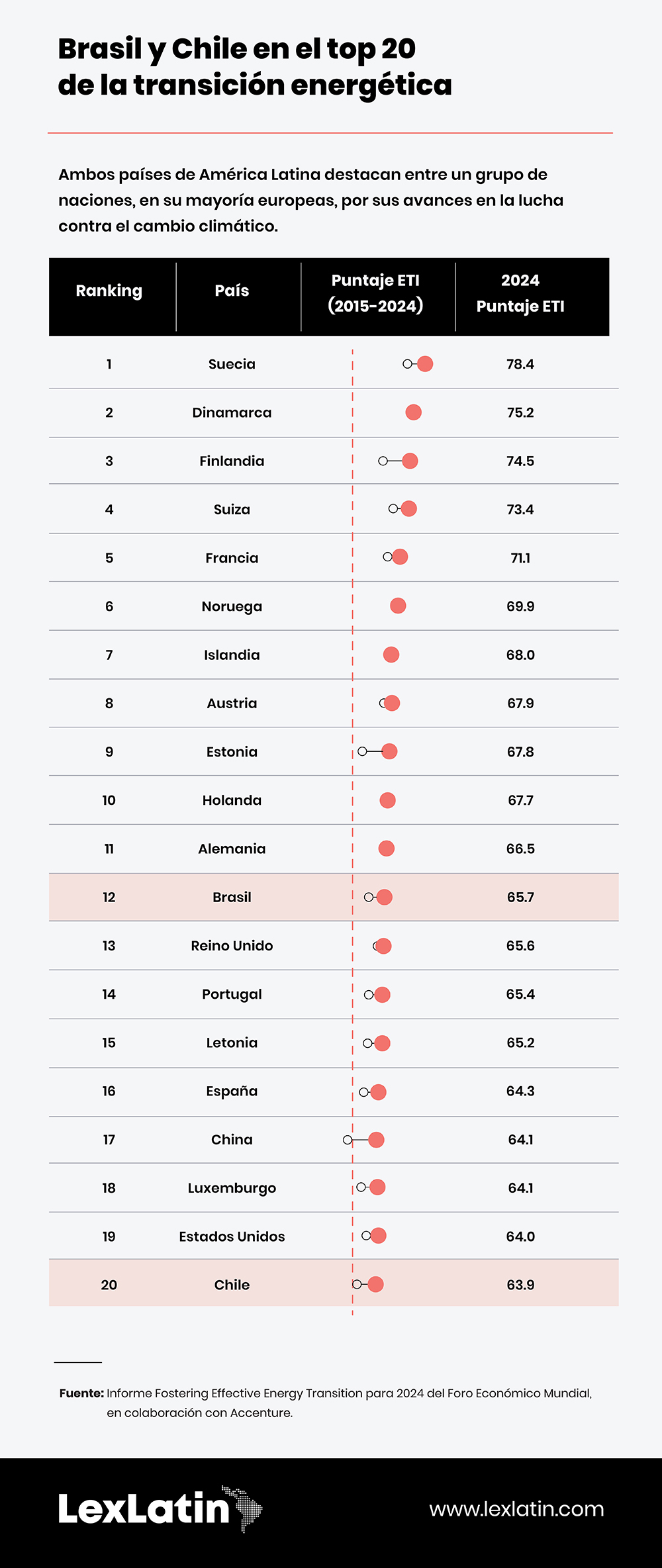We invite you to read the LexLatin publication in which our director of the Energy and Infrastructure Group, Federico Rodríguez, commented on how the energy transition is progressing in Chile.
Since 2015, the transition towards decarbonization in Latin America has advanced, although not at the expected speed, according to the latest report of the World Economic Forum. While some countries have managed to stand out in the top positions of the Energy Transition Index (ETI) during 2024, such as Brazil, Chile and Costa Rica, for example, others, such as Mexico and Ecuador, are lagging behind.
There are several factors causing the slowdown in the achievement of global objectives, among them the global economic context of high inflation and interest rates, the increase in geopolitical tensions and changes in technology, in a process that demands large investments.
But one of the most important indicators is the domestic policy of the countries, evidenced by their commitment to diversify the energy matrix through regulation, although in some cases it has become a threat to the normal development of agreements between market players, increasing arbitration in the context of the transition, as Burford Capital points out in a recent report.
In this regard, Eric Franco, partner at Legal Delta, comments that, especially in the power generation sector, an increase in the risk of disputes is observed due to factors such as:
- The lower barrier of access to the players’ market, which leads to greater competition for areas to develop projects.
- The increase in environmental regulations and the expectations of the population in the area of influence of the projects, which makes it more laborious, costly and sometimes unfeasible to carry out projects.
- The use of new technologies, since it brings with it the risk of defects in innovative equipment, being very costly when a large number of equipment is affected.
- The change of contractual schemes, going from generation plants with few generation units, such as gas turbines, to many units that can operate separately, such as wind turbines or solar panels.
“Since the investment challenge is so great and there is no time or money to waste, an essential aspect is to change the adversarial approach to project development to a more collaborative one. Collaboration in the construction industry requires a paradigm shift and is gaining significant international support,” he explains.
For the specialist in international infrastructure and construction project contracts, the starting point is to move from a scheme that aims to negotiate ‘the transfer of as many risks as possible’ to one in which the risk is assigned to whoever ‘is in the best position to manage it’, and also recognizes that the most important thing is to manage the risks and not just assign them, for the benefit of the project.
Based on the idea that sustainability also applies to contractual relationships, he comments that contracts have been drawn up for a long time with an adversarial scheme and this is reflected in the high level of conflict, both in the construction industry and in the energy industry in general, something that must change in order to create healthy long-term relationships and face challenging and complex contexts.
The context in Brazil, what challenges lie ahead for the country that has made the most progress in its energy transition?
With almost two decades of work, focused public policies and abundance of natural resources, Brazil leads Latin America in the energy transition, with the adoption of renewable energies on a large scale.
Rosi Costa Barros, a partner in the energy and natural resources area of Demarest Advogados, says that the publication of the Alternative Sources Incentives Program, almost 20 years ago, facilitated the contracting of energy from alternative sources (under development at the time) and the creation of subsidies that allowed discounts in the tariffs for the use of transmission and distribution systems to plants that generate energy from these sources and their respective consumers. Today this energy represents almost 90% of the Brazilian electricity matrix, according to data from the National Operator of the Brazilian Electricity System (ONS).
However, for Thais Araujo Rato Tarelho, also a lawyer in the energy and natural resources area of Demarest, the country has many challenges ahead, including energy security, transportation infrastructure, energy generation from other sources, the economic viability, for example, of offshore wind farms, and the training of professionals who can meet the technological demands linked to the transition, one of the most discussed topics at the G20.
“There is progress in this area that depends on a greater partnership between investors and public authorities. In this trail of innovation, the ideal is a flexible regulatory scenario that does not discourage investment and promotes practical results,” Costa reinforces.
In regulatory matters, in August this year Brazil marked a milestone by passing Law 14.948, which not only includes incentives for the development of low-carbon hydrogen projects, but also for the production of biofuels (ethanol, biogas or biomethane), aimed at obtaining hydrogen with low carbon emissions.
Also in August, the country published the National Energy Transition Policy, with general guidelines and concepts for moving towards decarbonization, highlighting issues of universalization, energy security and reduction of energy inequality, among others.
On the road to the so-called net zero, the transportation sector is one of the main concerns, as it ranks second in the Brazilian ranking of largest emitters of greenhouse gases, according to the Climate Observatory (2022), so there is an agenda under discussion that includes:
- Development of large-scale technology for the use of fuel cells that use green hydrogen as a vector.
- Electrification of the fleet, which will require the development of infrastructure to enable vehicle recharging.
- Incentives for the production of vehicles that comply with the energy transition agenda.
An advance on the road is the Future Fuels Act, which was enacted last October 8.
Chile’s medium-term plans
Chile’s remarkable progress in its energy transition is the result of a combination of natural advantages, with high levels of solar radiation in the north and significant wind capacities in the center-south (with very high plant factors in the south), and a solid regulatory framework, according to Federico Rodriguez, director of energy and infrastructure at Albagli Zaliasnik.
“These high plant factors have made wind energy particularly attractive, not only for domestic supply, but also as a source for green hydrogen production”, he says, convinced that the government’s policy of public land tenders for renewable energy projects, recently expanded to include green hydrogen development, has been key to this.
In regulatory matters, the country seeks to strengthen its transition to a decarbonized economy and optimize the use of its natural resources in several ways, which, according to AZ’s lawyer, are:
- Reforms to the environmental assessment and permitting system: Reforms are being promoted to make the system more agile and predictable to facilitate the planning and execution of renewable projects while guaranteeing the environmental and social protection of the territories.
- Progressive reduction of fossil fuel subsidies. The gradual transition of this type of subsidies towards incentives for clean energy is a fundamental step to create fair competition and incentivize the adoption of sustainable solutions, increasing the competitiveness of renewable energies over conventional ones.
- Regulatory framework for green hydrogen and energy storage. Chile is developing a specific regulatory framework for green hydrogen, which establishes standards for its production, safety and commercialization. The National Green Hydrogen Strategy, promoted by the Chilean Ministry of Energy, is a key milestone in this direction and positions the country as a potential exporter of clean hydrogen. At the same time, the National Energy Commission (CNE) is working on regulations that encourage energy storage, such as the use of BESS systems, which will strengthen the stability of the electricity grid and allow the intermittency of renewable sources to be managed.
- Use of the Institute of Clean Technologies. Chile has vast reserves of lithium, an essential mineral for energy storage in batteries, both in electric vehicles and in large-scale storage systems. The Production Development Corporation (Corfo), through the Institute of Clean Technologies, with the promotion of research and development in energy storage technologies and the efficient use of lithium, becomes an engine of innovation for the energy transition.
- Implementation of carbon credits and emissions markets. This will allow companies to meet their emission reduction targets in a flexible and efficient manner, while generating a source of financing for new clean energy projects.
Source: LexLatin, 07 November 2024.




